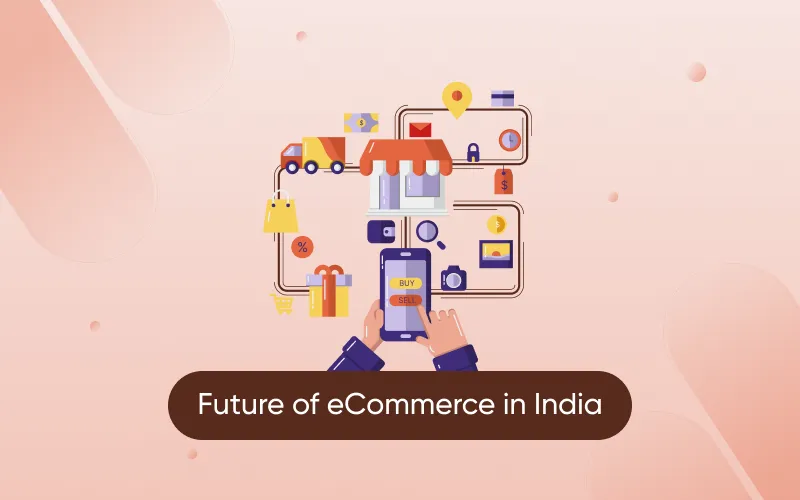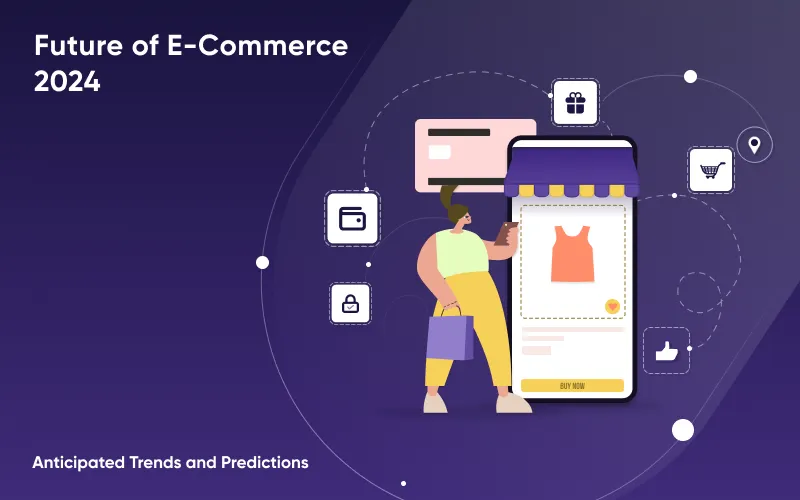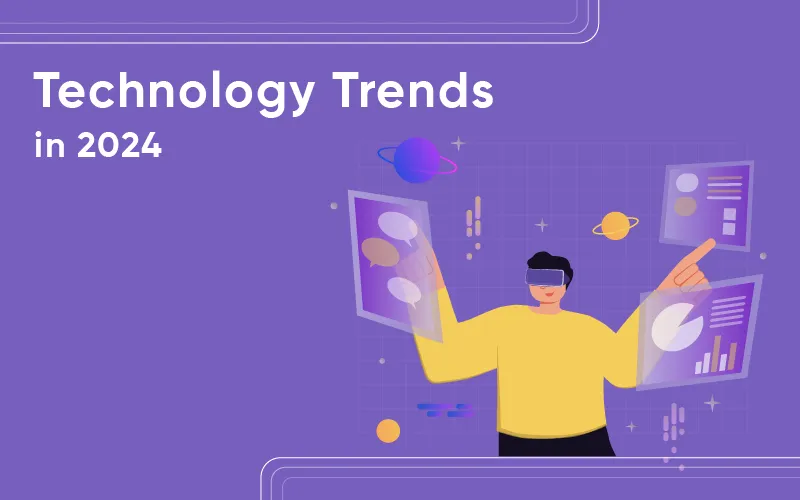eCommerce Trends 2024! eCommerce is set to revolutionize how we shop. The fast-paced adoption of technology continues to be a key driver, shaping the foundations of the e-commerce industry. Therefore, it becomes essential for eCommerce businesses to opt for eCommerce application development.
Regarding ecommerce trends, 2024 brings augmented reality shopping and personalized AI recommendations, ensuring a seamless and immersive online experience for consumers. As we look ahead in e-commerce, we foresee the fusion of advanced technologies streamlining purchases and enhancing user engagement to unprecedented levels.
Consumer expectations are evolving unprecedentedly, and e-commerce businesses are adapting to meet these demands head-on. Thus, the future of online retail will see a rise in demand for sustainability and ethics. It urges businesses to reevaluate their supply chains and environmental impact. Expect a rise in social commerce, driving a shift to a more interactive shopping experience in the eComm space.
Beyond the mentioned trends, eCommerce mobile app development is more than just transactions. It's about creating experiences, driving innovations, and staying ahead in this fast-paced digital age. However, before going ahead with trends, let's get aware of the growth of eCommerce in India.
https://quokkalabs.com/blog/top-20-technology-trends-in-2024/
E-Commerce Trends 2024 in India
Recent industry projections indicate India is poised to lead global retail e-commerce app development from 2023 to 2027, boasting a remarkable compound annual growth rate (CAGR) of 14.1 percent. The current valuation of the Indian e-commerce market stands at 63.17 billion U.S. dollars. Argentina and Brazil also emerge as significant players, experiencing rapid growth with a CAGR exceeding 13.6 percent. The global retail e-commerce CAGR is estimated at 11.16 percent during the same period.
 The projected value of the Indian online retail market is expected to exceed 100 billion U.S. dollars by 2027. While this growth is impressive, it's worth noting that several e-commerce markets, such as the United States, have already approached the trillion-dollar milestone.
The projected value of the Indian online retail market is expected to exceed 100 billion U.S. dollars by 2027. While this growth is impressive, it's worth noting that several e-commerce markets, such as the United States, have already approached the trillion-dollar milestone.
Why are eCommerce Trends Vital to Know?
Staying ahead of the curve is foremost in the rapidly growing eCommerce industry. Recognizing the importance of forecasting future trends can give businesses a competitive edge and position them for success. Here's a closer look at why understanding upcoming eCommerce trends is crucial.
Strategic Planning
Knowledge of future eCommerce trends allows businesses to plan and align their operations with emerging consumer preferences strategically. This proactive approach positions companies to capitalize on evolving market dynamics.
Adaptability in a Dynamic Market
The digital marketplace constantly evolves, influenced by technological advancements and changing consumer behaviors. Awareness of future trends enables businesses to adapt swiftly to new challenges and opportunities.
Enhanced Customer Engagement
Anticipating and incorporating upcoming trends ensures that businesses can meet customer expectations effectively. This heightened relevance enhances customer engagement, fostering loyalty and long-term relationships.
Competitive Edge
Staying abreast in eCommerce app development in a crowded eCommerce landscape provides a competitive advantage. Businesses offering innovative solutions and experiences based on evolving market demands are more likely to stand out.
Technology Integration
Knowledge of future eCommerce trends aids in the strategic integration of cutting-edge technologies. Whether adopting AI-powered solutions or embracing augmented reality, businesses can leverage technology to enhance the customer experience.
Optimized Marketing Strategies
Future trends shape consumer behavior and preferences. Businesses that align their marketing strategies with these evolving trends can create more targeted and effective campaigns, maximizing their reach and impact.
Innovative Product Development
Foreknowledge of eCommerce trends facilitates innovative product development. Companies can create offerings that resonate with consumers' changing needs and desires, driving innovation within their product lines.
Global Market Expansion
As eCommerce trends often have a global impact, understanding them can support businesses in expanding their reach to international markets. This global perspective opens doors to new opportunities and diverse customer bases.
Knowing the eCommerce app development trends cannot be overstated. A strategic imperative empowers businesses to proactively shape their trajectories, ensuring they remain relevant, competitive, and prepared for the challenges and opportunities.
Explore eCommerce Mobile App Development Trends Happening Now
Innovation stands as the compass guiding businesses into uncharted territories. As we step boldly into the future, the top E-commerce trends 2024 promise not just evolution but a revolution in how we shop, connect, and transact.

AI-Powered Personalization
Artificial Intelligence is emerging as the custodian of personalized shopping experiences. By harnessing the power of machine learning, businesses can anticipate and respond to individual preferences. They tailor product recommendations and interactions to create a bespoke shopping journey for each customer.
Benefits of AI-powered Personalization in E-commerce Industry Trends
- Enhanced Customer Engagement
- Increased Conversion Rates
- Improved Customer Loyalty
- Streamlined Shopping Journeys
- Optimized Inventory Management
https://quokkalabs.com/blog/how-ai-ml-can-transform-the-mobile-app-development-industry/
Augmented Reality Shopping
AR shopping is another eCommerce mobile app development trend of 2024. Integrating augmented reality (AR) into eCommerce platforms redefines the online shopping experience. Customers can virtually visualize products, try them before purchasing, and make informed decisions, bridging the gap between the digital and physical realms.
Benefits of Augmented Reality Shopping in E-commerce Industry Trends
- Enhanced Product Visualization
- Reduced Returns and Increased Confidence
- Elevated Customer Engagement
- Personalized Shopping Experiences
- Competitive Advantage
https://quokkalabs.com/blog/vr-ar-app-development-an-overview/
Voice Commerce Integration
Voice commerce, the fusion of voice technology and online retail, reshapes how consumers interact with e-commerce platforms. This innovative integration allows users to make purchases, search for products, and manage their shopping lists using voice commands. As virtual assistants like Siri, Alexa, and Google Assistant become more sophisticated, voice commerce offers several advantages in convenience, speed, and accessibility.
Benefits of Voice Commerce Integration Trends in the eCommerce Industry
- Seamless Convenience
- Efficient Search and Discovery
- Enhanced Accessibility
- Personalized Recommendations
- Multitasking Capabilities
- Instant Order Placement
- Integration with Smart Devices
Sustainable eCommerce Practices
The eCommerce mobile app development trends are combined with sustainable ecommerce practices. A growing consciousness towards environmental sustainability is influencing consumer choices. eCommerce businesses are increasingly adopting eco-friendly practices, from sustainable packaging to promoting products with lower carbon footprints.
Benefits of Sustainable eCommerce Practices in ecommerce Industry Trends
- Environmental Stewardship
- Enhanced Brand Reputation
- Cost Savings through Efficiency
- Compliance with Regulations
- Market Competitiveness
Sustainable practices differentiate businesses in a crowded market. As eco-conscious consumerism grows, adopting sustainability trends in eCommerce positions a brand as forward-thinking, attracting a broader customer base and staying competitive.
Social Commerce Evolution: Unveiling the Next eCommerce Mobile App Development Trends
The fusion of social media and online shopping has given rise to Social Commerce, a transformative trend beyond traditional transactions. Social Commerce is the integration of social media functionalities with eCommerce platforms, creating an immersive and seamless shopping experience for users. This evolution brings forth a range of benefits for businesses operating in the eCommerce industry.
Benefits of Social Commerce Evolution in the E-Commerce Industry Trends
- Enhanced Customer Engagement
- Influencer Marketing Amplification
- Seamless Purchase Journey
- Real-Time Customer Feedback
- Expanding Reach and Discoverability
- User-Generated Content Integration
- Mobile-First Shopping Experience
- Personalized Shopping Recommendations
The evolution of Social Commerce represents a paradigm shift in the eCommerce industry. Its benefits extend beyond transactional convenience, providing businesses with a powerful tool to connect, engage, and thrive in the dynamic world of online commerce. As Social Commerce continues to evolve, businesses that embrace and leverage this trend are poised not only to meet but exceed the expectations of the modern, socially connected consumer.
Blockchain: Revolutionizing the eCommerce Mobile App Development Trends
 In eCommerce, the integration of blockchain technology has emerged as a game-changer, ushering in an era of unparalleled trust and transparency. This revolutionary technology offers several key benefits in transforming the eCommerce industry. However, blockchain development services are booming in every industry worldwide due to their trust and transparency.
In eCommerce, the integration of blockchain technology has emerged as a game-changer, ushering in an era of unparalleled trust and transparency. This revolutionary technology offers several key benefits in transforming the eCommerce industry. However, blockchain development services are booming in every industry worldwide due to their trust and transparency.
Benefits of Blockchain Technology in E-commerce Industry Trends
- Enhanced Security
- Immutable Transaction Records
- Supply Chain Traceability
- Smart Contracts for Automation
- Fraud Prevention
- Data Privacy and Ownership
- Compliance with Regulations
Adopting blockchain technology in eCommerce not only addresses the challenges of security and transparency but also reshapes the entire customer experience. As businesses embrace this transformative technology, the benefits extend beyond efficiency gains, fostering a new era of trust and accountability in online transactions.https://quokkalabs.com/blog/solana-vs-ethereum-an-ultimate-comparison/
Mobile Commerce Dominance: Unveiling the eCommerce Mobile App Development Trends
In the rapidly evolving landscape of eCommerce, Mobile Commerce (mCommerce) has emerged as a dominant force, revolutionizing how consumers engage with online platforms. This surge in mobile-centric shopping brings many benefits for businesses and consumers, reshaping the dynamics of the eCommerce industry.
Benefits of Mobile Commerce Trends in the eCommerce Industry
- Ubiquitous Accessibility
- Seamless User Experience
- Real-Time Shopping Trends
- Enhanced Payment Convenience
- Location-Based Marketing Opportunities
- Optimized Marketing Strategies
- Cost-Effective Business Operations
- Adaptability to Emerging Technologies
The dominance of mobile commerce in the eCommerce industry transcends every transaction; it represents a paradigm shift in how businesses connect with consumers. Embracing this trend ensures relevance in a mobile-centric world and unlocks many benefits contributing to sustained growth and success in the ever-evolving eCommerce landscape.
Subscription-Based Models
Subscription-based models are also one of the eCommerce mobile app development trends. It involves offering products or services regularly, typically through monthly or annual subscriptions. This approach has gained significant traction across various sectors due to its ability to cultivate ongoing customer relationships. Here are some key benefits associated with subscription-based models.
Benefits of Subscription-Based Models eCommerce Industry Trends
- Predictable Revenue Streams
- Enhanced Customer Loyalty
- Improved Customer Retention
- Tailored Customer Experiences
- Data-Driven Insights
- Cross-Selling and Upselling Opportunities
- Adaptability to Various Industries
Subscription-based models are reshaping the eCommerce trends for 2024 by providing a steady revenue stream and fostering lasting customer connections. As businesses increasingly recognize the benefits of these models, the subscription trend continues to evolve and expand across various industries.
Contactless Payments Surge- A Game-Changer
The surge in contactless payments is reshaping the eCommerce mobile app development trends landscape. It helps in introducing unprecedented convenience and safety measures for consumers and businesses. This transformative shift to contactless transactions brings forth many benefits, propelling the industry into a new era of digital commerce.
Benefits of Contactless Payments Surge Trends in the eCommerce Industry
- Enhanced Convenience
- Improved Security Measures
- Adaptation to Changing Consumer Preferences
- Accelerated Digital Transformation
- Contactless for a Contactless World
- Increased Customer Trust
- Streamlined International Transactions
- Data-Driven Insights
The surge in contactless payments is not merely a trend but a transformative force driving the eCommerce industry forward. Businesses can shape a more agile and customer-centric digital commerce landscape by prioritizing convenience, security, and customer preferences.
Hyper-Personalized Email Marketing
The eCommerce mobile app development trends are also combining hyper-personalized email marketing. It has emerged as a game-changer, transforming generic promotional outreach into targeted, individualized communication. This strategy involves tailoring email content to match each recipient's unique preferences, behaviors, and interests, maximizing engagement and driving conversions. Let's delve into the benefits that hyper-personalized email marketing brings to the eCommerce industry:
Benefits of Hyper-Personalized Email Marketing ecommerce industry trends
- Higher Conversion Rates
- Improved Customer Retention
- Optimized Marketing Spend
- Data-Driven Insights
- Improved Open and Click-Through Rates
- Adaptability Across Customer Segments
Hyper-personalized email marketing is a powerful tool in the eCommerce arsenal, delivering tailored content that meets the expectations of modern consumers and propels businesses ahead in a competitive market. As eCommerce continues to evolve, the ability to create meaningful connections through personalized communication remains a key driver of success.
https://quokkalabs.com/blog/mobile-app-marketing-guide-to-master-user-retention-reducing-uninstall-rate/
AR-Powered Virtual Fitting Rooms- Transforming E-Commerce Experience
AR-powered virtual fitting rooms have emerged as a revolutionary tool, bridging the gap between the digital and physical realms of the fashion industry. This technology allows consumers to virtually try on clothing and accessories before purchasing. It offers a personalized and interactive experience that goes beyond traditional online shopping.
Benefits of AR-Powered Virtual Fitting Rooms Trends in the eCommerce Industry
- Reduced Returns and Increased Confidence
- Enhanced Customer Engagement
- Personalization and Customization
- Innovative Marketing and Brand Differentiation
- Data-Driven Insights for Inventory Management
- Accessible and Inclusive Shopping Experience
AR-powered virtual fitting rooms revolutionize the e-commerce experience by combining technology and fashion, offering tangible benefits to consumers and businesses. As the fashion industry embraces digital transformation, virtual fitting rooms are key in providing a seamless, personalized, and enjoyable online shopping journey.
Live Commerce Experiences
Live Commerce, an innovative blend of real-time interaction and online shopping, has emerged as a powerful ecommerce trends for 2024. This engaging format involves live streaming, where businesses can showcase products, interact with customers, and facilitate immediate purchases. Live Commerce's benefits are reshaping how brands connect with their audience and drive sales.
Benefits of Live Commerce Experiences in eCommerce Industry Trends
- Real-Time Interaction
- Increased Customer Engagement
- Authenticity and Transparency
- Social Media Integration
- Instant Feedback and Market Research
- Cross-Selling and Up-Selling Opportunities
- Memorable Shopping Experiences
- Data-driven Performance Insights
Live Commerce is transforming eCommerce by offering a dynamic and interactive shopping experience. From building brand trust to driving sales, the benefits of incorporating Live Commerce into eCommerce strategies are significant.
Customer Service Chatbots
 Another eCommerce mobile app development trends are customer service chatbots. They have emerged as invaluable tools, transforming how businesses interact with customers. These automated conversational agents leverage artificial intelligence and natural language processing to provide instant and efficient customer support. Here's a closer look at the benefits they bring to the e-commerce industry:
Another eCommerce mobile app development trends are customer service chatbots. They have emerged as invaluable tools, transforming how businesses interact with customers. These automated conversational agents leverage artificial intelligence and natural language processing to provide instant and efficient customer support. Here's a closer look at the benefits they bring to the e-commerce industry:
Benefits of Customer Service Chatbots in eCommerce Industry Trends
- 24/7 Availability
- Instantaneous Responses
- Cost-Efficiency & Scalability
- Personalized Interactions
- Multilingual Support
- Data Insights and Analytics
- Reduced Cart Abandonment
- Consistent Service Quality
Customer Service Chatbots are pivotal in revolutionizing customer support within the e-commerce industry. Their ability to offer instant, personalized, cost-effective assistance streamlines business operations and elevates the customer journey, making them indispensable assets in the modern e-commerce landscape.
Data Privacy Emphasis
The eCommerce mobile app development trends also include data privacy emphasis. A robust emphasis on data privacy is emerging as a cornerstone for building and maintaining customer trust. This strategic focus addresses evolving regulatory requirements and unlocks several key business benefits.
Benefits of Data Privacy Emphasis Trends in the eCommerce Industry
- Compliance Assurance
- Reduced Cybersecurity Risks
- Improved Reputation and Brand Image
- Effective Personalization without Intrusion
- Strategic Marketing Advantage
- Data-Driven Decision Confidence
In essence, placing a strong emphasis on data privacy in the eCommerce industry is not just a compliance necessity; it's a strategic imperative. Businesses can fortify trust, enhance brand value, and confidently navigate the digital landscape. The E-commerce trends 2024 ensure sustained success in an era where data protection is paramount.
Let me clarify: the above-listed trends are happening in 2024 within iOS and Android application development services.
Final Thoughts
The ecommerce trends of 2024 promise a dynamic evolution driven by anticipated trends and predictions. As we anticipate augmented reality experiences, AI integration, and a consumer-centric marketplace, businesses are not merely participants but architects of change. This transformative era heralds a shift towards immersive, personalized, and sustainable online commerce. Businesses must navigate with adaptability, resilience, and a commitment to staying at the forefront of technology. The canvas is ready, and the masterpiece of e-commerce's future awaits its creators in the landscape 2024.

Tags
Future of eCommerce Trends
eCommerce Trends



 Facebook
Facebook
 Twitter
Twitter
 LinkedIn
LinkedIn
 Pinterest
Pinterest

 The projected value of the Indian online retail market is expected to exceed
The projected value of the Indian online retail market is expected to exceed 


 In eCommerce, the integration of blockchain technology has emerged as a game-changer, ushering in an era of unparalleled trust and transparency. This revolutionary technology offers several key benefits in transforming the eCommerce industry. However,
In eCommerce, the integration of blockchain technology has emerged as a game-changer, ushering in an era of unparalleled trust and transparency. This revolutionary technology offers several key benefits in transforming the eCommerce industry. However, 

 Another eCommerce mobile app development trends are customer service chatbots. They have emerged as invaluable tools, transforming how businesses interact with customers. These automated conversational agents leverage artificial intelligence and natural language processing to provide instant and efficient customer support. Here's a closer look at the benefits they bring to the e-commerce industry:
Another eCommerce mobile app development trends are customer service chatbots. They have emerged as invaluable tools, transforming how businesses interact with customers. These automated conversational agents leverage artificial intelligence and natural language processing to provide instant and efficient customer support. Here's a closer look at the benefits they bring to the e-commerce industry:





